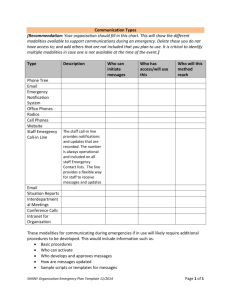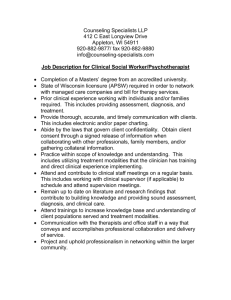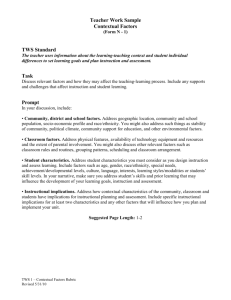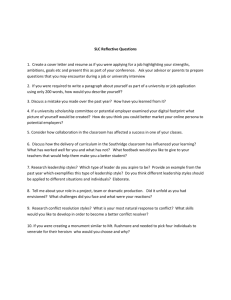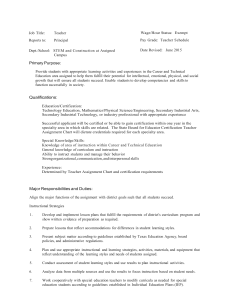Contextual Factors
advertisement
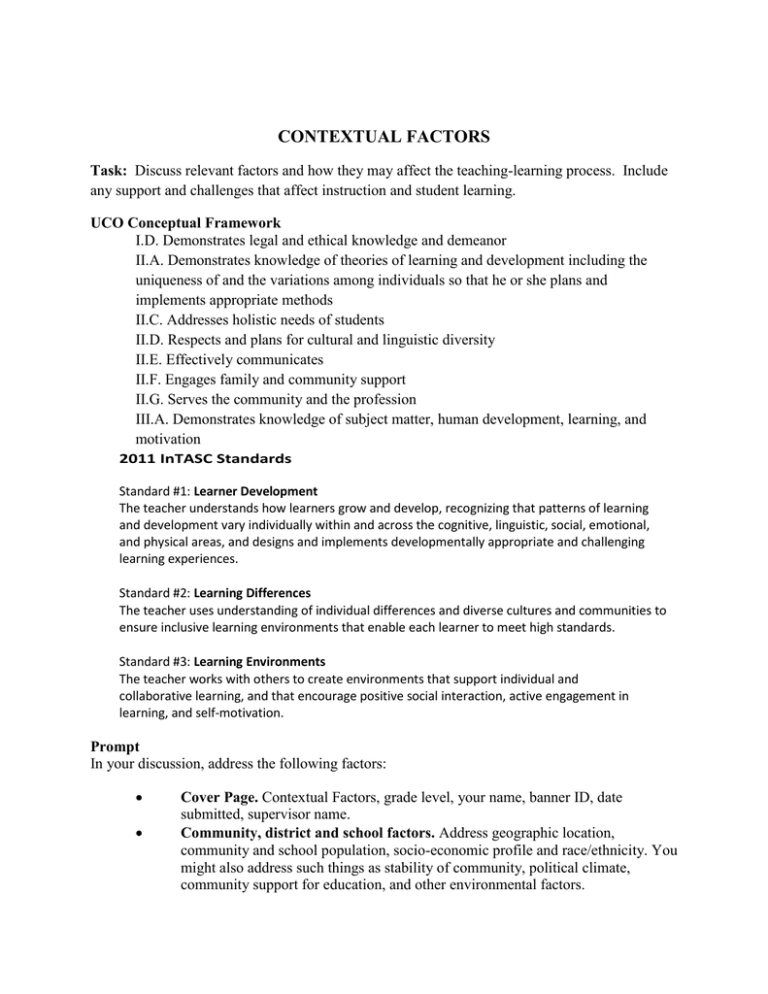
CONTEXTUAL FACTORS Task: Discuss relevant factors and how they may affect the teaching-learning process. Include any support and challenges that affect instruction and student learning. UCO Conceptual Framework I.D. Demonstrates legal and ethical knowledge and demeanor II.A. Demonstrates knowledge of theories of learning and development including the uniqueness of and the variations among individuals so that he or she plans and implements appropriate methods II.C. Addresses holistic needs of students II.D. Respects and plans for cultural and linguistic diversity II.E. Effectively communicates II.F. Engages family and community support II.G. Serves the community and the profession III.A. Demonstrates knowledge of subject matter, human development, learning, and motivation 2011 InTASC Standards Standard #1: Learner Development The teacher understands how learners grow and develop, recognizing that patterns of learning and development vary individually within and across the cognitive, linguistic, social, emotional, and physical areas, and designs and implements developmentally appropriate and challenging learning experiences. Standard #2: Learning Differences The teacher uses understanding of individual differences and diverse cultures and communities to ensure inclusive learning environments that enable each learner to meet high standards. Standard #3: Learning Environments The teacher works with others to create environments that support individual and collaborative learning, and that encourage positive social interaction, active engagement in learning, and self-motivation. Prompt In your discussion, address the following factors: Cover Page. Contextual Factors, grade level, your name, banner ID, date submitted, supervisor name. Community, district and school factors. Address geographic location, community and school population, socio-economic profile and race/ethnicity. You might also address such things as stability of community, political climate, community support for education, and other environmental factors. Classroom factors. Address physical features, availability of technology equipment and resources and the extent of parental involvement. You might also discuss other relevant factors such as classroom rules and routines, grouping patterns, scheduling and classroom arrangement. Student characteristics. Address student characteristics you must consider as you design instruction and assess learning. Include factors such as age, gender, race/ethnicity, special needs, achievement/ developmental levels, culture, language, interests, learning styles/modalities or students’ skill levels. In your narrative, make sure you address students’ skills and prior learning that may influence the development of your learning goals, instruction and assessment. Instructional implications. Address how contextual characteristics of the community, classroom and students have implications for instructional planning and assessment. Include specific instructional implications for at least two characteristics and any other factors that will influence how you plan and implement your unit. Name: ____________________ Contextual Factors Rubric Task: Discuss relevant factors and how they may affect the teaching-learning process. Include any support and challenges that affect instruction and student learning. First Submission_________________ Revised Submission__________________ Indicator Unacceptable Basic Knowledge of Community, School, and Classroom Factors Response indicates minimal, irrelevant, or biased information. Prompt elements requested are omitted. Response is superficial lacking depth of thought in analysis. Response indicates limited knowledge of prompt factors. Narrative merely describes factors without explaining how each impacts students and instruction. Response indicates developing knowledge regarding geographic location, population, SES, and ethnic profiles and the impact of these factors on classroom instruction. Response indicates understanding regarding geographic location, population, SES, and ethnic profiles and the impact of these factors on classroom instruction. Response indicates thorough understanding of geographic location, population, SES, and ethnic profiles and the impact of these factors on classroom instruction. Response includes discussion of stability, political climate, support. Knowledge of Student Characteristics Response indicates a stereotypical view, irrelevant or minimal knowledge of student differences. Prompt elements are not fully addressed. Response indicates limited knowledge of student differences that may affect learning. Narrative merely describes factors. Response indicates general knowledge of age, gender, race/ ethnicity, developmental levels, language, and culture. Response indicates general and specific knowledge of age, gender, race/ ethnicity, developmental levels, language, and culture. Response indicates comprehensive knowledge of age, gender, race/ethnicity, developmental levels, language, and culture. Prompt elements discussed indepth. Knowledge of Students’ Varied Approaches to Learning Response indicates minimal, stereotypical, or irrelevant knowledge about the different ways students learn. Response fails to identify students’ learning styles or modalities. Response indicates limited knowledge of special needs, learning styles, modalities and skill levels that may affect learning. Response indicates general understanding of special needs, learning styles, modalities and skill levels that may affect learning. Response indicates general and specific understanding of special needs, learning styles, modalities and skill levels that may affect learning. Response is appropriately detailed. Response indicates in-depth understanding of special needs, learning styles, modalities and skill levels that may affect learning for the group and individuals. Attention to approaches to maximize student learning. Knowledge of Students’ Skills And Prior Learning Response indicates little or irrelevant knowledge of prior skills and learning. Response indicates prior learning is minimally addressed. Prior learning discussion lacks depth and detail with no connection to potential learning goals. Prior learning is addressed and relates to discussion of potential learning goals. Prior learning is thoroughly addressed and clearly relates to discussion of potential learning goals. Response fails to discuss implications for instruction and assessment or provides inappropriate implications Response is simplistic in discussion for instruction and assessment. Response indicates general implications for instruction and assessment based on conceptual factors Decisions exhibit a monocular perspective (i.e. teaching one way to all). Response indicates specific implications for instruction and assessment based on conceptual factors. Response addresses compensatory activities for special needs. Response indicates thorough understanding of how conceptual factors impact instructional planning and assessment. Response addresses compensatory activities for special needs. Implications for Instructional Planning and Assessment Developing Proficient Outstanding Planning Phase Approval Sheet Planning Phase: Before you teach the unit, you will describe the contextual factors, identify learning goals based on state and/or district standards, create an assessment plan to measure student performance before, during, and after instruction, and plan for the instruction. This section should be reviewed and approved by your mentor and university supervisor. 1. Discussed Unit of Study plans with university supervisor. (Signature indicates approval) Comments: University Supervisor’s Signature Date 2. Discussed Unit of Study plans with mentor teacher. (Signature indicates approval) Comments: Coordinate the time frame for the presentation of the Unit of Study with Mentor teacher Date(s): Time/Period(s): Mentor Teacher’s Signature Date
